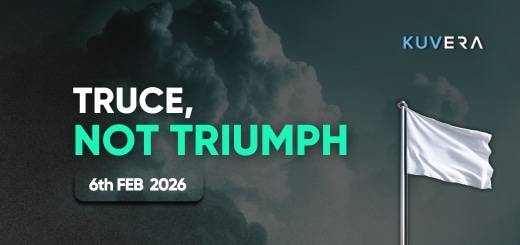In this edition, we talk about the global climate deal signed at the COP29 conference in Baku and what it means. We also talk about the second-quarter GDP growth data, the latest developments related to the Adani Group, and the death of Essar Group co-founder Shashi Ruia.
Welcome to Kuvera’s weekly digest on the most critical developments related to business, finance, and the markets.
tl;dr Hear the article in brief instead?

Go to Heaven for the climate, Hell for the company – Mark Twain
The widely acclaimed American writer and humorist is believed to have made the statement sometime in the late 19th century. But he probably didn’t think it through.
Before you go after the not-so-acclaimed writer of this weekly newsletter for damaging Twain’s reputation, take a second to ponder upon this small question: What if the climate changes?
Haah, we got you there, didn’t we? Even Twain would be flummoxed while puffing on a cigar and enjoying Hell, we bet.
Okay, okay, let’s move on from heaven and hell and get back to the mundane business of life as it went by on the planet earth this past week. And let’s talk about climate change, for real this time.
You see, the biggest development of the past week was the agreement on climate change that nearly 200 countries at the UN’s COP29 conference managed to hash out after two weeks of negotiations in Baku, the capital of Azerbaijan.
We promise we won’t go into lengthy details, so here’s a gist of the agreement and why it matters.
As per the agreement, about two dozen of the world’s most industrialized nations—such as the US, Canada, France and Germany—will provide $300 billion annually in climate finance to developing economies. This money, the countries hope, will help control global warming and help poorer nations cope with the effects of climate change.
Now, $300 billion a year sounds like a lot of money. And it is up from $100 billion a year currently. But developing countries, including India, were disappointed. For one, the $300-billion limit will be reached only by 2035. More importantly, it is far below the $1.3 trillion that developing nations were expecting. Indian delegation representative Chandni Raina even called the agreement “nothing more than an optical illusion”.
For some more perspective, let’s take a look at how big the amount really is. The amount is less than half a year of India’s merchandise imports and less than half of the forex reserves.
The amount looks even smaller in global context. It is less than the net worth of Elon Musk, the world’s richest man, and not even 10% of the market capitalization of Apple Inc or Microsoft or Nvidia.
More worryingly, it is a fraction of the amount countries spend on their armed forces. The total global military expenditure reached $2,443 billion in 2023, with the US alone spending more than $900 billion, according to the Stockholm International Peace Research Institute.
And it is also far less than the damages countries suffer due to natural calamities, which are increasingly becoming more frequent and more severe. For instance, the total estimated damages from Hurricane Helene in the US—the second-deadliest US hurricane in 50 years, could top $250 billion, according to AccuWeather, a private weather forecaster.
Realists may say something is better than nothing, especially as Europe and the Middle East remain entangled in wars and conflicts and as Donald Trump—who calls climate change a hoax—takes office as the US president in January.
But whether we like it or not, climate change is a reality. And the sooner world leaders accept it, the better it would be.
Economic Climate
India’s economic climate has substantially worsened in recent months with government data this Friday showing the country’s gross domestic product grew at 5.4% in the fiscal second quarter ended on Sept. 30. This is far slower than the first quarter’s 6.7% expansion and the slowest pace in seven quarters, according to the National Statistics Office.
This is the third quarter in a row that GDP growth in India has slowed, although the country remains one of the world’s fastest-growing major economies. Moreover, Q2 economic growth is below the Reserve Bank of India’s estimate of 7%.
Why is economic growth slowing? Well, one of the major reasons for the slowdown is weak urban consumption as inflation, particularly food inflation, remains high. A tepid rise in salaries and wages as well as high interest rates make matters worse. In fact, weakening private consumption, which accounts for nearly 60% of the GDP, has even offset an increase in government spending and also hurt corporate earnings during the July-September quarter.
Will slowing growth nudge the RBI to cut interest rates at its policy meeting next month?
The RBI left its repo rate unchanged at 6.50% last month and changed its policy stance to “neutral, indicating that rate cuts are around the corner. Even Finance Minister Nirmala Sitharaman and Commerce Minister Piyush Goyal have in recent weeks favoured a cut in interest rates to boost growth.
RBI Governor Shaktikanta Das and its Monetary Policy Committee have thus far resisted pressure to cut rates, especially after retail inflation accelerated to 6.21% in October—breaching the RBI’s 6% upper limit. But it may now find it extremely difficult to resist the pressure after the sharp slowdown in GDP growth.
Corporate Climate

While the actual climate and the economic climate change ever so slowly, corporate climate can change far more quickly. A case in point is the Adani Group, which last week found itself in the middle of a US bribery and fraud scandal but seems to be bouncing back. The group moved quickly this week to defend itself and found support from several quarters.
International Holding Company, an Abu Dhabi-based conglomerate that is an investor in Adani Enterprises, said its outlook on investments in the Adani Group remained unchanged while the Tanzanian government said it would retain its agreement with Adani Ports for a container terminal.
The Israeli envoy to India, Reuven Azar, told Reuters that Israel wanted the group to continue investing in the country and that allegations by US authorities were not problematic from Israel’s point of view. The Adani Group holds a 70% stake in Israel’s Haifa port while Adani Defence has a joint venture with an Israeli company to make military equipment including drones.
At home, the Kerala government said Adani Ports will invest an extra Rs 10,000 crore in a deep-sea facility in the southern state. Meanwhile, media reports said Japanese banks such as Mizuho intend to continue doing business with Adani Group companies.
But not everything is hunky-dory. The Bangladesh government said it was investigating power generation contracts with Adani Power while Sri Lanka said it would probe Adani-related projects. French oil giant TotalEnergies said it was pausing its business with Adani Green and credit ratings agencies changing their outlook on Adani bonds to negative.
Overall, however, the week turned out to be good for the Adani Group with most of its companies recovering their losses in the stock market.
Will the climate change again for the group in coming weeks? Your guess is as good as ours!
Farewell, Mr Ruia
In another key corporate development, Essar Group co-founder and billionaire Shashikant Ruia passed away this week. He was 81.
Born in 1943, Shashi Ruia began working in 1965 and built one of India’s biggest corporate groups along with his brother Ravi over the next three decades before things turned for the worse.
Essar entered the steel, telecom and petroleum sectors in the 1990s. It set up steel factories, ports, an oil refinery at Vadinar in Gujarat, and a telecom joint venture with Hong Kong’s Hutchison.
However, the debt-fueled expansion and a change in the commodity cycle eventually forced the group to sell its steel, telecom and oil refining business. While ArcelorMittal acquired Essar Steel through an insolvency process, Russian oil giant Rosneft bought the Vadinar refinery. Essar exited the telecom sector a little more than a decade ago by selling its stake to Vodafone Group.
Despite the asset sales, Essar remains one of India’s largest groups with presence in power, ports, shipping, metals and mining, and oil and gas exploration and production, with total annual revenue of more than $15 billion.
Shashi Ruia’s death comes less than two months after India lost another corporate titan—Ratan Tata. Like Tata, the business that Ruia built has stood the test of time, no matter how and when the business winds changed.
Market Wrap
Indian stock markets oscillated between gains and losses this week. On three of the five days this week, the benchmark Sensex and Nifty 50 rose or fell by 1% or higher.
Overall, the 30-stock Sensex ended the week with gains of almost 0.9% and the 50-stock Nifty managed to close about 1.0% higher, helped by foreign fund inflows.
Adani Enterprises, which lost more than a fifth of its value last week, was the top Nifty gainer this week and rose almost 10%. Adani Ports also bounced back after slumping nearly 10% last week.
Other major stocks that helped push the Nifty higher included state-run companies Bharat Electronics and ONGC as well as Reliance Industries, Bharti Airtel and financial stocks such as Shriram Finance, State Bank of India and HDFC Bank.
The stocks that were a drag on the Nifty included insurance companies SBI Life and HDFC Life, and automakers Bajaj Auto and Eicher. IT stocks also ended in the red, after rising over the past couple of weeks thanks to the rupee’s weakness.
Other Headlines
- Reliance Industries buys 21% stake in US helium explorer Wavetech Helium for $12 million.
- Vedanta to build copper smelter, refinery in Saudi Arabia with total investment of $2 billion.
- Hindustan Unilever board approves carving out ice-cream business into separate listed company.
- Zee Entertainment shareholders reject reappointment of Punit Goenka as director.
- NTPC Green Energy gains 14% on listing day, commands Rs 1.02 trillion market cap.
- Enviro Infra Engineers shares list at 49% premium after Rs 650-crore subscribed 90 times.
- SEBI eases ban on Axis Capital managing debt offers.
- SBI Mutual Fund names Nand Kishore as new MD and CEO.
- Govt plans changes in insurance law for unified licence and to lift FDI limit, reports Reuters.
- Competition Commission of India to investigate Google’s gaming app policy after complaint by WinZo.
That’s all for this week. Until next week, happy investing!
Interested in how we think about the markets?
Read more: Zen And The Art Of Investing
Watch here: Investing in International Markets
Start investing through a platform that brings goal planning and investing to your fingertips. Visit kuvera.in to discover Direct Plans and Fixed Deposits and start investing today. #MutualFundSahiHai #KuveraSabseSahiHai












